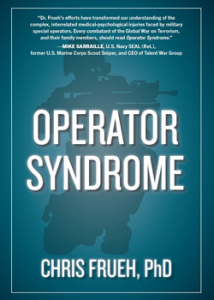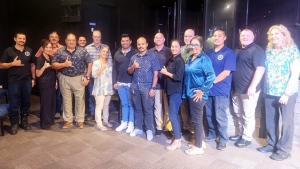What do elite soldiers and firefighters have in common? According to a University of Hawaiʻi at Hilo psychology Professor Chris Frueh—more than you'd think.
After decades of studying the health of military veterans, Frueh has turned his attention to first responders. His findings show that firefighters, paramedics and police officers face a heavy, often invisible, burden—one he calls "Firefighter Syndrome."
Frueh and his research team say firefighting involves regular exposure to chronic stress, lethal risks and potential for a wide range of injuries, including traumatic brain injuries and toxic exposures.
Hawaiʻi Island first responders

He shared his message with Hawaiʻi Island's first responders during a workshop in Hilo and will be giving another in Kona.
His research—highlighted in his recent book, Operator Syndrome —outlines how years of trauma can lead to a complex set of injuries: sleep disorders, PTSD, hormonal imbalances, pain, depression and more. Originally focused on military special operators, Frueh's work has revealed striking similarities in the health challenges faced by first responders.
"Dr. Frueh's presentation helped them understand the many physiological impacts that, in turn, affect their mental health, as well as the current treatments that are available," said Renee Godoy, chaplain for both Hawaiʻi Island police and fire departments and leader of the nonprofit Friends of First Responders Hawaiʻi Island.
The workshops provide tools to help first responders recognize warning signs and seek care. Frueh and his team created a practical guide that includes suicide risk assessment, peer support strategies, and tips on finding the right health providers.
Word is spreading

His message is catching on beyond Hawaiʻi. Frueh is speaking with law enforcement and fire departments across the country. A start up company led by current and former military special operators has also developed a business to provide coaching services to first responders using the Operator Syndrome framework.
"It's a really great concept, retired [Special Operation Forces] operators continuing service by coaching and mentoring police and firefighters. They are doing more to spread the Operator Syndrome framework and physiological perspective nationally, than I could ever do by myself," Frueh said.
For more go to UH Hilo Stories.
—By Susan Enright
The post UH Hilo prof shines light on hidden toll of first responder life first appeared on University of Hawaiʻi System News .






